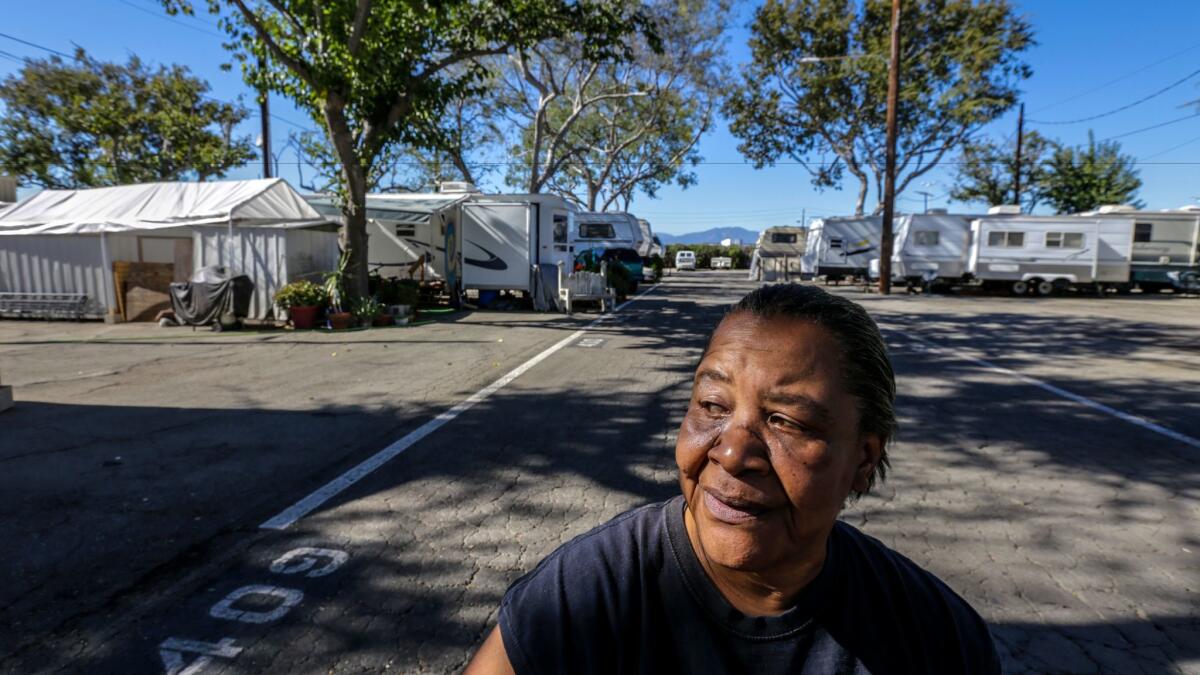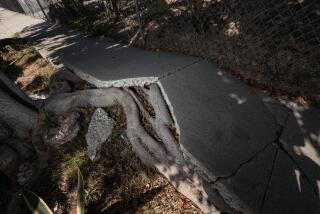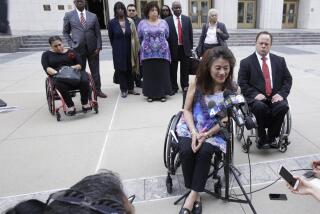They paid a bogus tax for years. Now, fairgrounds trailer park tenants will get some money back

Every month for many years, tenants living at a trailer park at the Los Angeles County fairgrounds were charged not only rent, but a 10% tax.
It was a tax they never should have been hit with.
Now, the nonprofit operator of the fairgrounds, the Los Angeles County Fair Assn., has agreed to pay $325,000 to resolve a lawsuit, according to court documents. More than 475 people are believed to be eligible for a reimbursement.
The amount is based upon improperly collected taxes received by the fair association for four years before the filing of a lawsuit in 2015, an attorney for the tenants, Raymond Chandler, said. Chandler said the average payout will probably be $1,300 to $1,400.
On Wednesday, Los Angeles County Superior Court Judge Ann Jones extended the postmark deadline to May 22 for 477 tenants to file for a reimbursement. So far, only 184 people have responded to request the refund, Chandler said.
The settlement does not cover all of the improperly collected taxes. Longtime residents say they have been charged the tax for 10 years or more, and some have said they paid as much as $5,000 in improperly levied taxes.
“Something is better than nothing,” said resident Ellen McKeever-Jacobs, 58. But she still was unhappy at the money she has lost over the years, adding: “That was money out of our pocket. I think they should’ve given it all back to us.”
Resident Eric Zavalza agreed. Zavalza estimated he and his mother are owed more than $4,000. “Considering those of us who have been here longer … that’s not a lot of money,” he said.
But the statute of limitations for civil suits alleging unfair business practices is four years prior to the filing of the lawsuit, Chandler said. Trying to go back further in time would have required a legal effort that he said would have been time-consuming and impractical.
Last year, the Fair Assn. said it was not its responsibility to reimburse the tenants. The association said the funds were delivered to the city of Pomona and that the fair association did not benefit from the revenue.
But on Tuesday, the new chief executive, Miguel Santana, said the fair association agreed to the settlement to address concerns about how the trailer park has been managed.
“The Fairplex’s interests are in bringing resolution to this issue,” said Santana, who has been on the job for three months. “Bringing closure to concerns about the [trailer] park is part of my effort to move forward and think about the future.”
Santana said the Fairplex has hired a new trailer park manager and has submitted plans to a state regulatory agency for more renovations, which will include giving trailers more space, making improvements to lighting and landscaping and modernizing utilities. Santana said the renovations will reduce the overall capacity of the trailer park from its limit of 158 spaces, but that long-term residents will not be displaced.
The agreement comes after The Times last year reported on problems at the trailer park. Residents complained of open sewer pipes that unleashed the stench of raw sewage, bathrooms in disrepair, overhead power lines peeling insulation, and roads and walkways marked by potholes and cracked pavement.
Santana said the fair association has already spent $250,000 to renovate the public bathrooms and showers.
The fair association has long levied a “transient occupancy” tax, the same levied on hotel guests, on behalf of the city of Pomona. But the tax is only supposed to be levied on transients renting a location for 30 days or less.
The city refunded a year’s worth of the tax money to residents who filed a claim — about $46,000 to 95 people in the trailer park, and about $39,000 to 63 residents in a separate RV park on the fairgrounds — and blamed the association for the improper collections.
Those who claim the reimbursement will receive at least 70% of the improperly collected taxes they paid over the four-year period covered by the settlement, Chandler said. They could receive up to 100% depending on how many people respond to the claims administrator.
The L.A. County Fair Assn., which operates on land owned by the county, has been in a state of turmoil since 2015, when two rave attendees suffered fatal drug overdoses at the fairgrounds and the parents of one of the dead filed a lawsuit.
The Times subsequently published reports on the lucrative pay and benefits given to the previous chief executive, James Henwood Jr., and other top managers as the nonprofit reported financial losses.
Henwood received more than $1 million in total compensation in 2014, far more than other fair executives in California. Separately, a state audit concluded that taxpayers were denied millions of dollars in revenue from the fair’s hotel and conference center and its other enterprises, and government auditors called for the association to pay back rent.
Henwood resigned in 2016. A moratorium on raves at the fairgrounds is in place.
Henwood’s replacement, Santana, who until last year was Los Angeles’ city administrative officer, has launched an effort to improve the Fairplex’s standing with elected officials and Pomona residents.
Santana said he has embarked on a strategic process to imagine what the Fairplex should look like over the next century. He has scheduled eight public meetings on topics like governance and transparency to solicit feedback from the public. A schedule can be found at the Fairplex’s website.
Santana, who is making roughly half of what his predecessor made in 2014, declined to answer questions about revising compensation of other executives.
Critics say they welcome the gestures from Santana, but say the fair association has a lot of work to do to recover from what they view as the group’s secretive and insular reputation. They say the association also focuses on maximizing revenue at the expense of the neighborhood, which residents say has been disrupted by alcohol- and drug-fueled events.
“There needs to be more folks from the community that may not always agree with the fair,” Pomona City Councilman Robert Torres said of the association’s outreach. “It’s going to take time to build up trust again.”
Among the suggestions: Meetings of the association’s board of directors should be open to the public, as well as meetings between city and fair officials, said resident Judy St. John. And the association’s governing board should welcome representatives of neighborhood groups, like hers, which have clashed with the Fair Assn.
“They need to include people who will be forthright with them about negative impacts,” St. John said. “Sometimes I wonder about what real change is going to come since the board of directors is remaining the same.”
More to Read
Sign up for Essential California
The most important California stories and recommendations in your inbox every morning.
You may occasionally receive promotional content from the Los Angeles Times.











